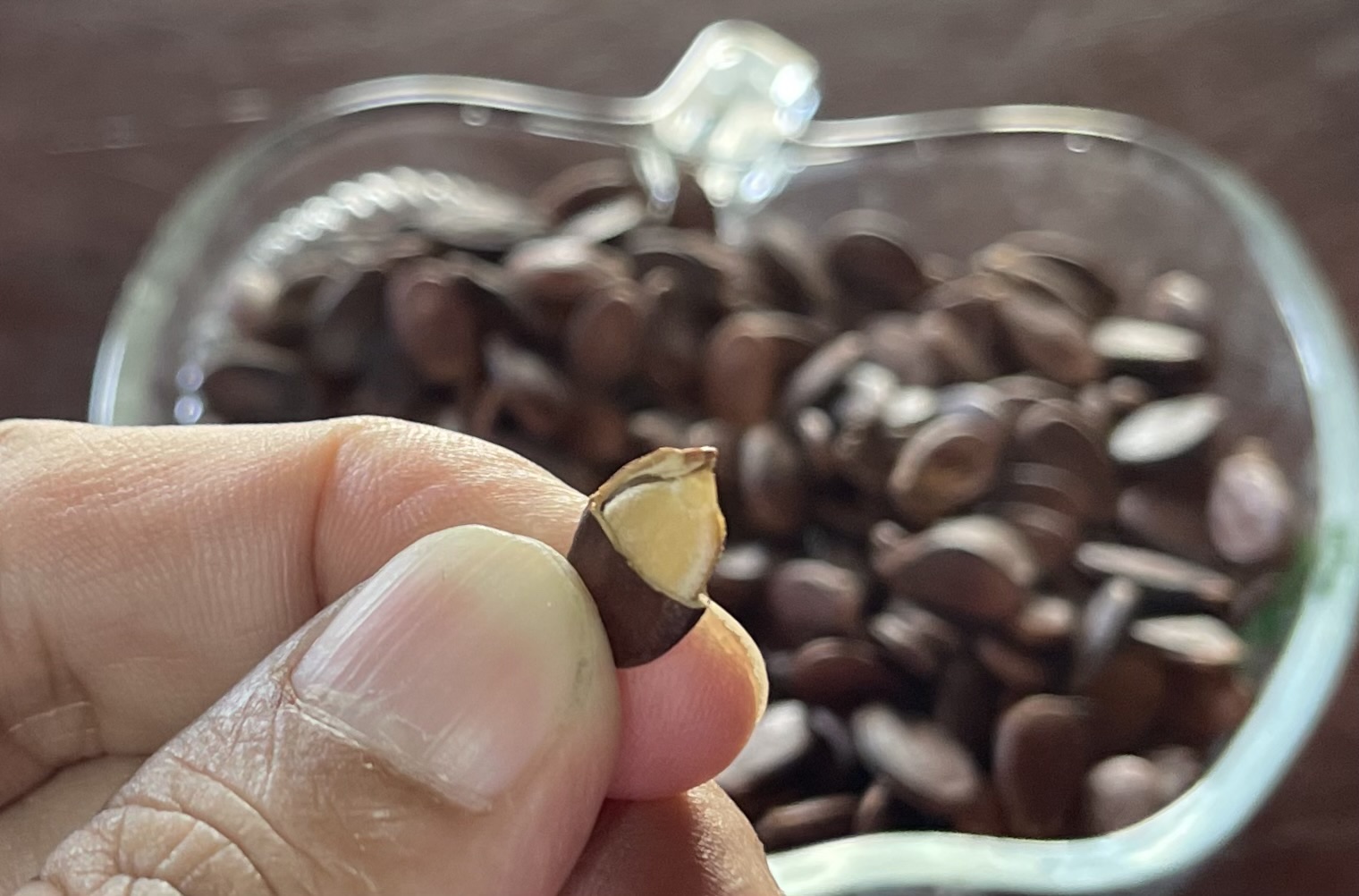Muting is usually not a symptom of a dangerous disease, but it is annoying and can make the holiday less than perfect.
Does eating seeds mute?
Is mute caused by eating watermelon seeds, sunflower seeds, cashews, chestnuts…? In fact, these nuts do not cause loss of voice. However, the silk shell and high fat (oil) content of these nuts are irritants that cause coughing, leading to inflammation of the larynx, resulting in hoarseness and loss of voice.
If you find yourself coughing a lot and losing your voice after eating these nuts, you should stop, drink warm water, and maybe gargle. After that, you should eat warm, soft, or liquid foods, and limit speaking loudly... to soothe the throat lining, reduce irritation, and give the larynx time to recover.

Limit eating nuts if you have a cough.
In addition, using herbal cough syrup or honey is also a way to soothe irritation, reduce coughing and gradually reduce hoarseness symptoms.
Does drinking lots of ice water mute your voice?
Drinking too much cold water can cause sore throat. In addition, ice sold on the street can be produced from unsanitary water sources, even water containing viruses or bacteria. Therefore, when drinking ice, you can be attacked by viruses or bacteria, causing sore throat and laryngitis.
When you have symptoms of sore throat after drinking ice water such as coughing a lot, hoarseness or loss of voice, you should take the following measures to reduce irritation in the throat and larynx, reduce swelling and relieve pain:
Stop drinking ice and cold water and drink warm water, drink small sips and drink enough water every day; children according to weight and adults about 2 liters of water per day.
Limit talking, limit crying and absolutely limit screaming.
Clean oral hygiene includes brushing teeth, using a tongue brush, gargling with salt water, mouthwash or using oral sprays. However, with mouthwash and oral sprays, it should be used during sore throat and loss of voice, should not be used daily as it will cause imbalance in the microflora in the oral cavity.
Wear a mask when going out, stay away from dust and smoke.
Eat and drink with adequate nutrition, especially vitamins such as vitamin C from oranges, lemons, guavas, mangoes...
Does talking too much mute you?
During the holidays, the vocal system is "overloaded" due to playing, shouting, singing or just talking too much.
This "overload" makes the vocal organs sensitive because they work too much, do not have time to rest and recover, and are susceptible to infection. Even when symptoms of voice loss appear, whispering causes the vibrating membranes to vibrate as intensely as shouting.
So when you have a hoarse or mute voice, the first thing to do is to be quiet so that your throat and larynx have time to rest and recover.
To preserve your voice after Tet, you should not talk too much and continuously for more than an hour and not talk at too great a distance... When you have symptoms of losing your voice, you should immediately limit talking and combine the methods to soothe your throat and larynx as mentioned above.
Does incense smoke cause muteness?
Inhaling a lot of incense smoke can cause laryngitis with a mechanism of action no less than that of cigarettes.
Especially for those who are allergic to incense smoke, or inhale incense made from ingredients of unknown origin, toxic or too much fragrance, it will cause irritation of the respiratory tract mucosa, causing cough. From there, it damages the respiratory tract, including the larynx, causing laryngitis and hoarseness, even loss of voice.
For people with allergies or who are easily irritated by incense smoke, it is best to wear a mask when going out during Tet, limit staying in closed rooms where incense is being burned, the living environment should be airy and clean, especially the bedroom should have a flow of air blowing in and out. Take measures to soothe the throat and reduce swelling or laryngitis as mentioned in sections one and two.
Other causes
Other causes of mute during Tet include:
Fried foods contain a lot of grease which is a cough stimulant, mildly causing hoarseness, severely causing loss of voice.
Cold and dry weather during Tet, as well as spring travel during unfavorable weather often causes rhinopharyngitis or laryngitis. In addition, the air is too dry, causing the respiratory tract to produce protective phlegm and hinder pronunciation.
Staying up late and having an irregular lifestyle are indirect causes of laryngitis. When the body lacks sleep and nutrients, it will reduce resistance and make it susceptible to opportunistic diseases such as flu, influenza virus infection or other viruses and bacteria that cause respiratory tract inflammation; causing laryngitis due to the attack of the above agents.
Allergies, besides allergies to dust, tobacco or incense smoke as mentioned above, spring is the season of allergic diseases such as allergic rhinitis, bronchial asthma. Allergic diseases will appear with symptoms such as coughing, sneezing, runny nose, choking... For people with allergies, these symptoms appear quickly and persistently, causing laryngitis and loss of voice during Tet.
Laryngitis caused by viruses and bacteria
Tet is coming, places like supermarkets, cinemas, public places or even at home, where many people gather, are extremely favorable conditions for the spread of viruses and bacteria. These pathogens penetrate the body through natural openings, typically and most commonly the nose and throat, and cause laryngitis, causing hoarseness or loss of voice.
To prevent, the doctor's advice for you:
- Drink plenty of water, exercise regularly, eat on time and eat a variety of foods from all food groups.
- Get fully vaccinated and prioritize the two main vaccines that need to be vaccinated: influenza vaccine and pneumococcal vaccine.
- If you can determine the cause of your muteness, you should not smoke, limit places with many allergens; wear a mask and clean your body and living environment to minimize allergens.
Source link























![[Photo] Gia Lai provincial leaders offer flowers at Uncle Ho's Monument with the ethnic groups of the Central Highlands](https://vphoto.vietnam.vn/thumb/1200x675/vietnam/resource/IMAGE/2025/7/9/196438801da24b3cb6158d0501984818)













































































Comment (0)